International Mother Language Day, observed on February 21st, commemorates the linguistic diversity and promotes multilingualism worldwide. It was established by UNESCO in 1999 to honor the Bengali language movement in Bangladesh. The day raises awareness about linguistic and cultural diversity and encourages the preservation of mother languages to foster tolerance and respect among communities globally.
Good To Know About:
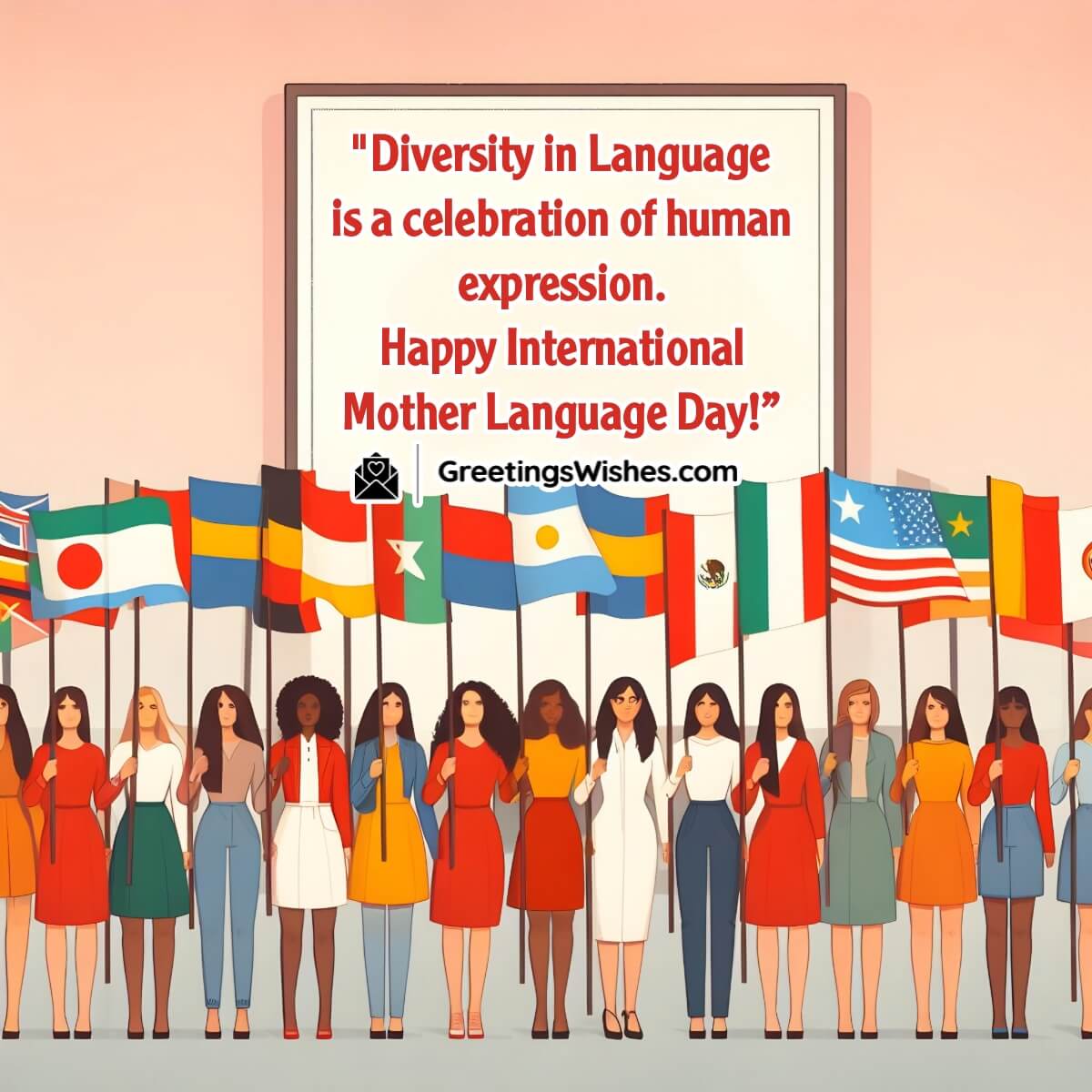
International Mother Language Day Messages
“Diversity in language is a celebration of human expression. Happy International Mother Language Day!”
“Language is the mirror of our culture and heritage. Let’s cherish and preserve it. Happy International Mother Language Day!”
“Every language is a piece of art, a treasure to be cherished. Happy International Mother Language Day!”
“Languages connect us to our past, define our present, and shape our future. Happy International Mother Language Day!”
“On this day, let’s pledge to honor and respect all languages, for they are the soul of our identity. Happy International Mother Language Day!”
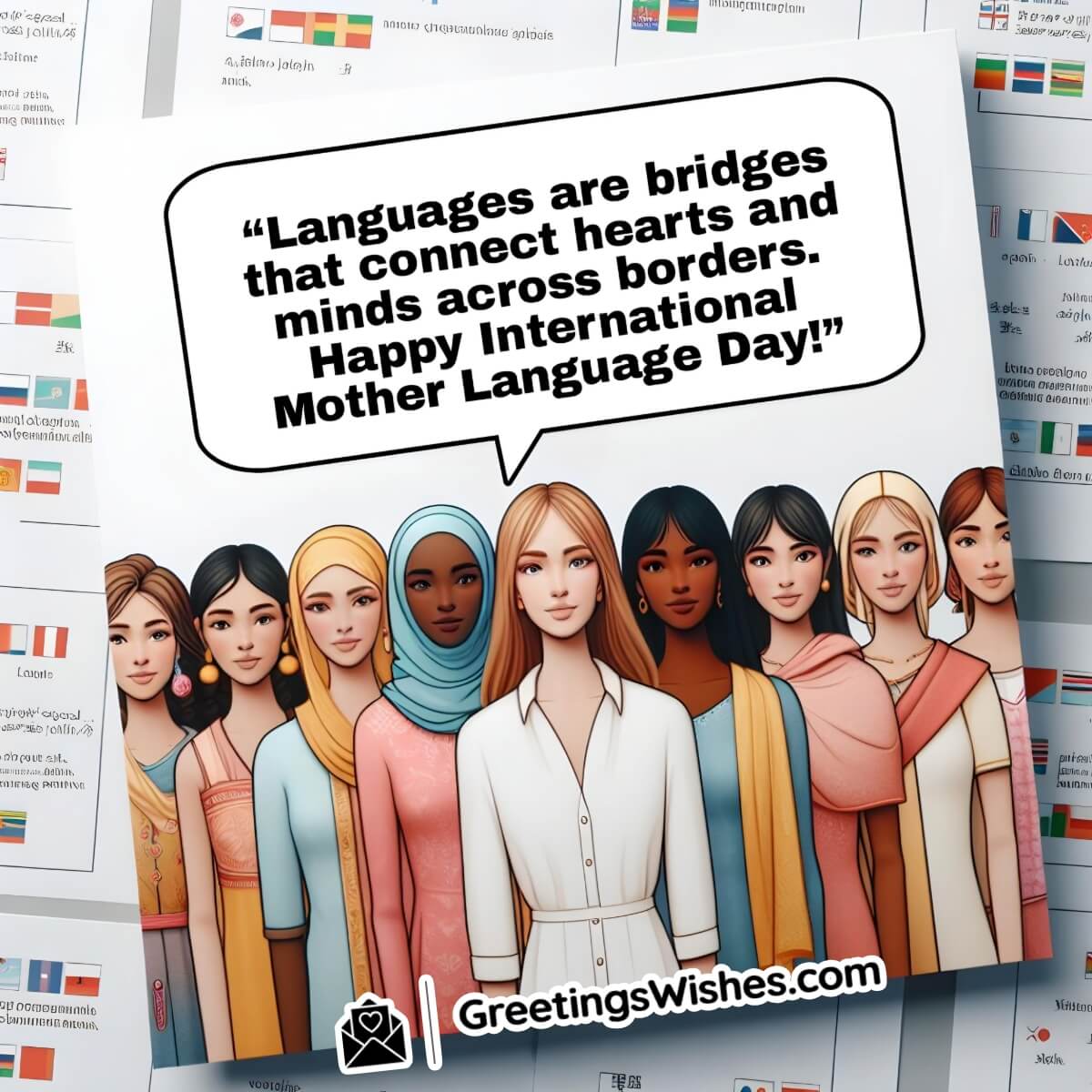
International Mother Language Day Message Picture
“Each language carries the stories, wisdom, and traditions of its people. Happy International Mother Language Day!”
“Languages are bridges that connect hearts and minds across borders. Happy International Mother Language Day!”
“Let’s celebrate linguistic diversity and promote the beauty of every mother tongue. Happy International Mother Language Day!”
“The world is a richer place because of its linguistic tapestry. Happy International Mother Language Day!”
“Language is the essence of humanity, the cornerstone of our civilizations. Happy International Mother Language Day!”

International Mother Language Day Wishes
Our mother language is what gives us our identity and we must always be proud of it. Wishing a very Happy International Mother Language Day to you.
Our mother tongue is what connects us to our culture and we should always be proud of it. Happy International Mother Language Day.
“No language is superior or inferior; each one is unique and valuable. Happy International Mother Language Day!”
“On this International Mother Language Day, let’s embrace our linguistic heritage with pride.”
Despite learning so many languages, I feel the most comfortable with my mother tongue. Happy International Mother Language Day!
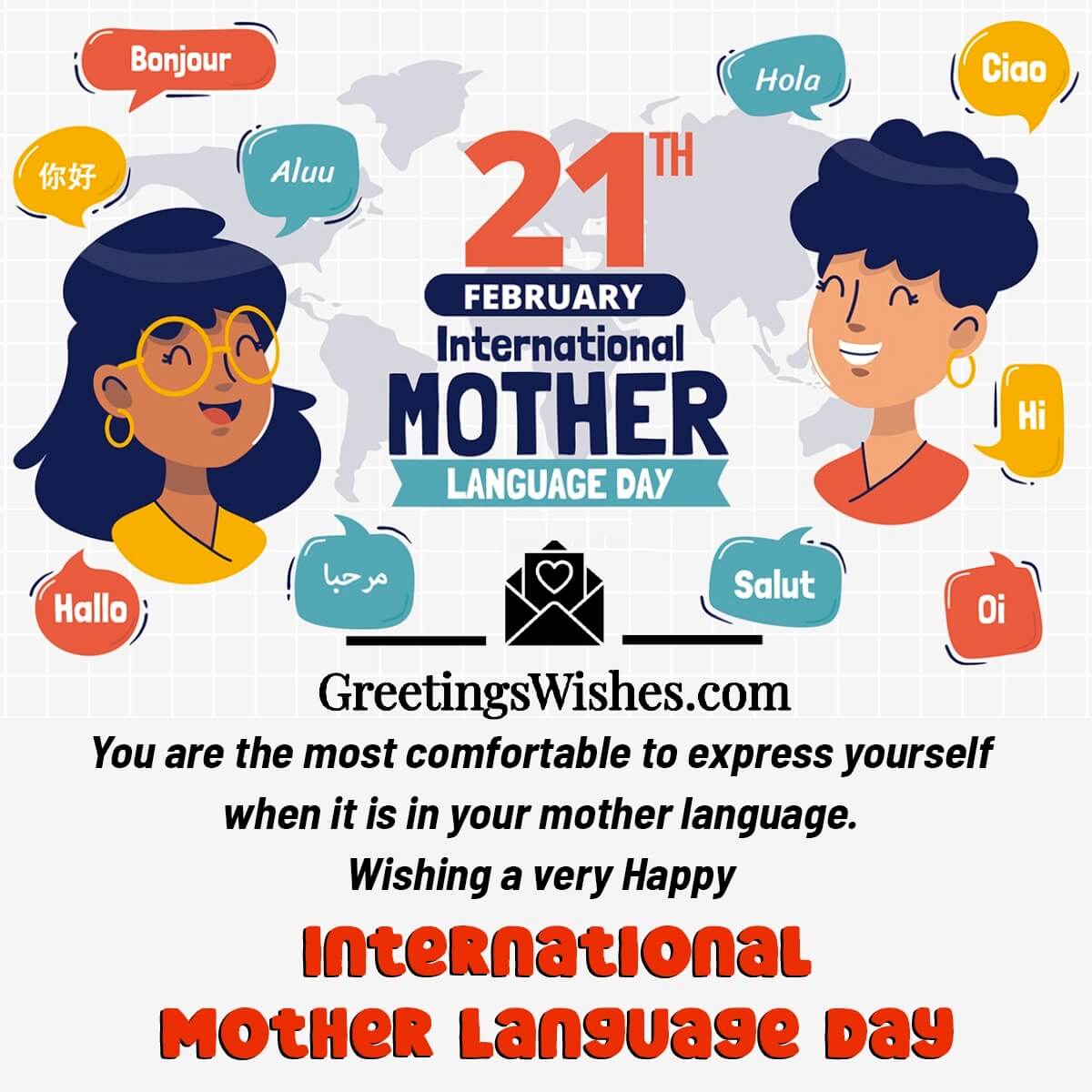
International Mother Language Day Message
You are the most comfortable to express yourself when it is in your mother language. Wishing a very Happy International Mother Language Day to you.
We may not realize that how important a mother language is for us and that’s why we must celebrate International Mother Language Day with great spirits.
“Languages are the threads that weave the fabric of our global community. Happy International Mother Language Day!”
“Through language, we express our thoughts, emotions, and culture. Happy International Mother Language Day!”
There is something special about mother language and that is what makes is so special. Wishing a very Happy International Mother Language Day to you.
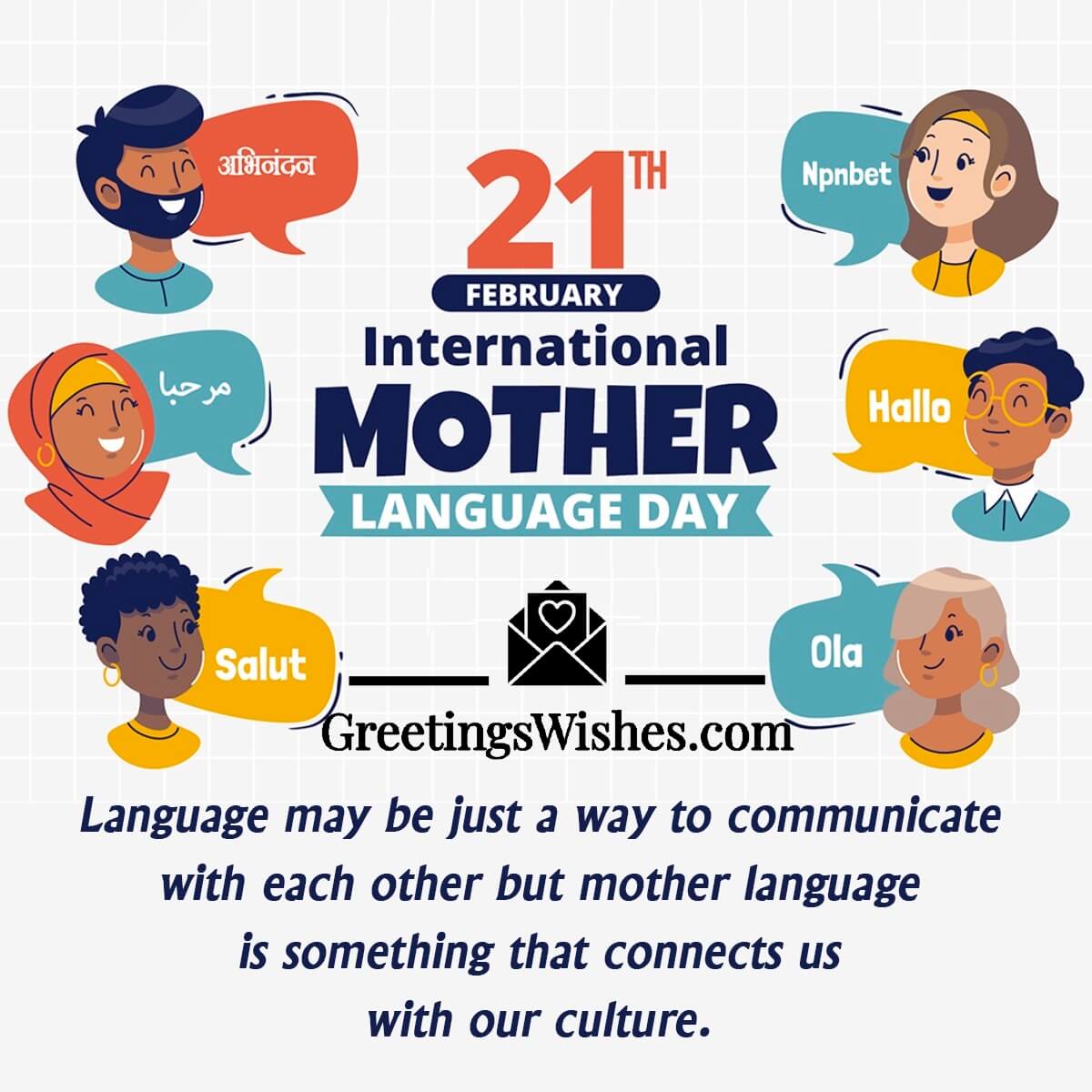
International Mother Language Day Quote
Language may be just a way to communicate with each other but mother language is something that connects us with our culture. Happy International Mother Language Day.
Let us come together and give the much deserved respect and attention to our mother language to make this a wonderful International Mother Language Day.
“Let’s promote linguistic equality and ensure that every language is heard and respected. Happy International Mother Language Day!”
“Today, we celebrate the beauty of words in all their forms and expressions. Happy International Mother Language Day!”
Language is defined as a way to express yourself and mother language is a language that connects us with our unique culture. Happy International Mother Language Day.
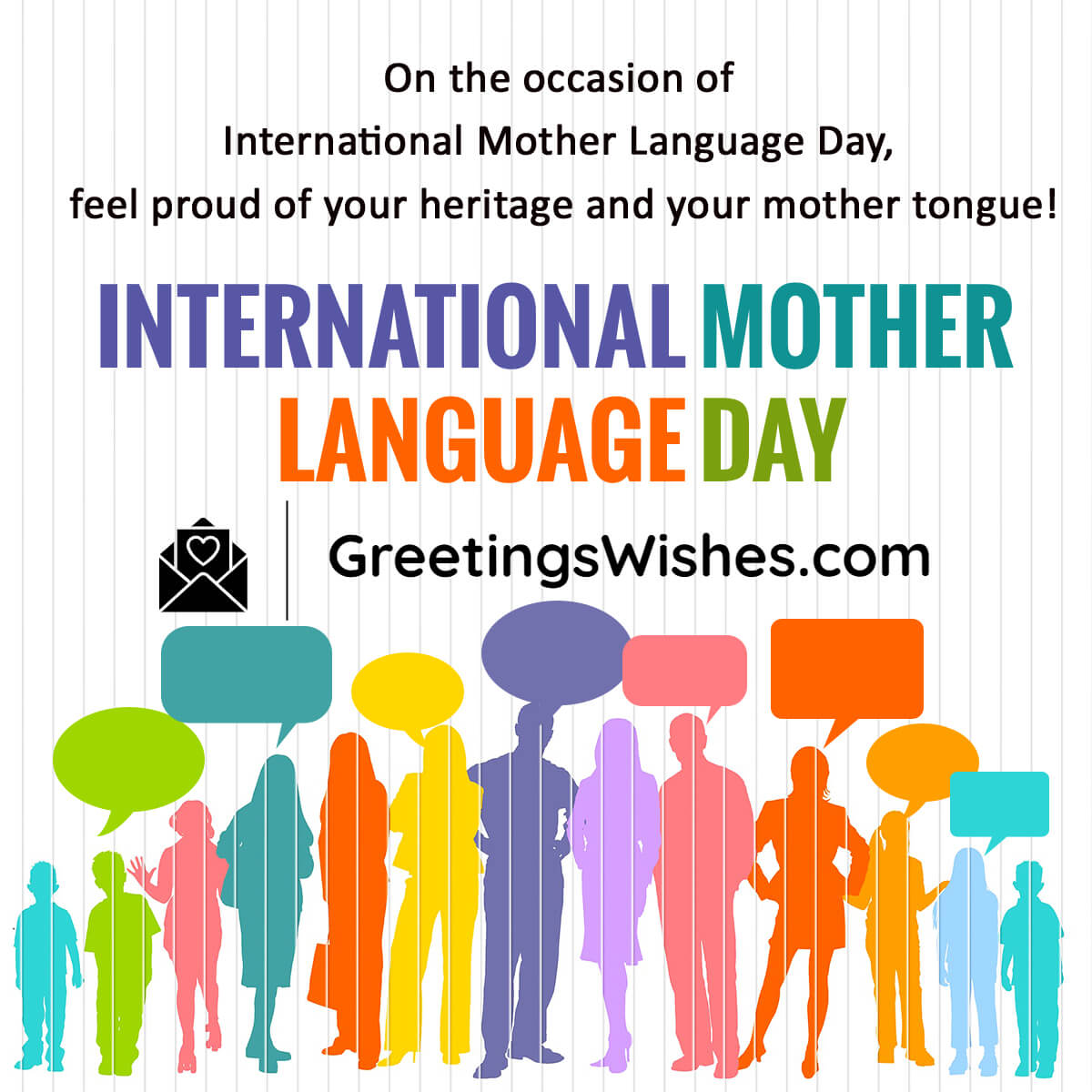
Mother Language Day
On the occasion of International Mother Language Day, feel proud of your heritage and your mother tongue!
When you express yourself in your mother tongue, you feel the most at ease. I wish you a very Happy International Mother Language Day.
“Language diversity is a treasure trove of knowledge and understanding. Happy International Mother Language Day!”
“Our languages define us, unite us, and enrich our lives. Happy International Mother Language Day!”
Warm wishes on International Mother Language Day to you. Never ever stop valuing your mother language as it is something to always respect and cherish.
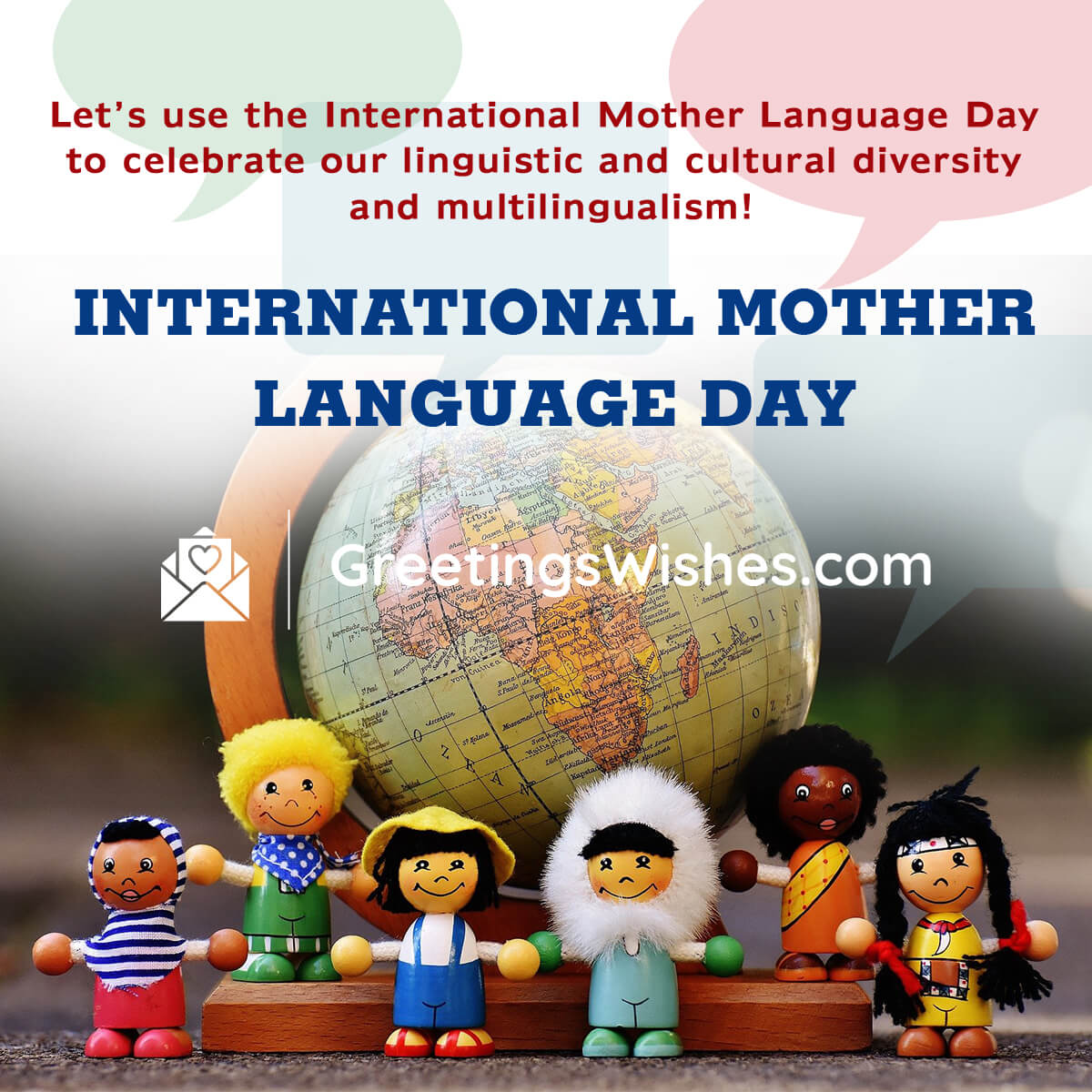
International Mother Language Day
Let’s use the International Mother Language Day to celebrate our linguistic and cultural diversity and multilingualism!
Let us all work together to offer our mother tongues the much-deserved respect and attention they deserve in order to make this a memorable International Mother Language Day.
“Let’s stand together to preserve and promote our mother tongues for generations to come. Happy International Mother Language Day!”
“Language is not just a means of communication; it’s a symbol of identity and belonging. Happy International Mother Language Day!”
The occasion of International Mother Language Day reminds us all that there is something special about mother language that makes it so beautiful. Warm wishes on this day to you.
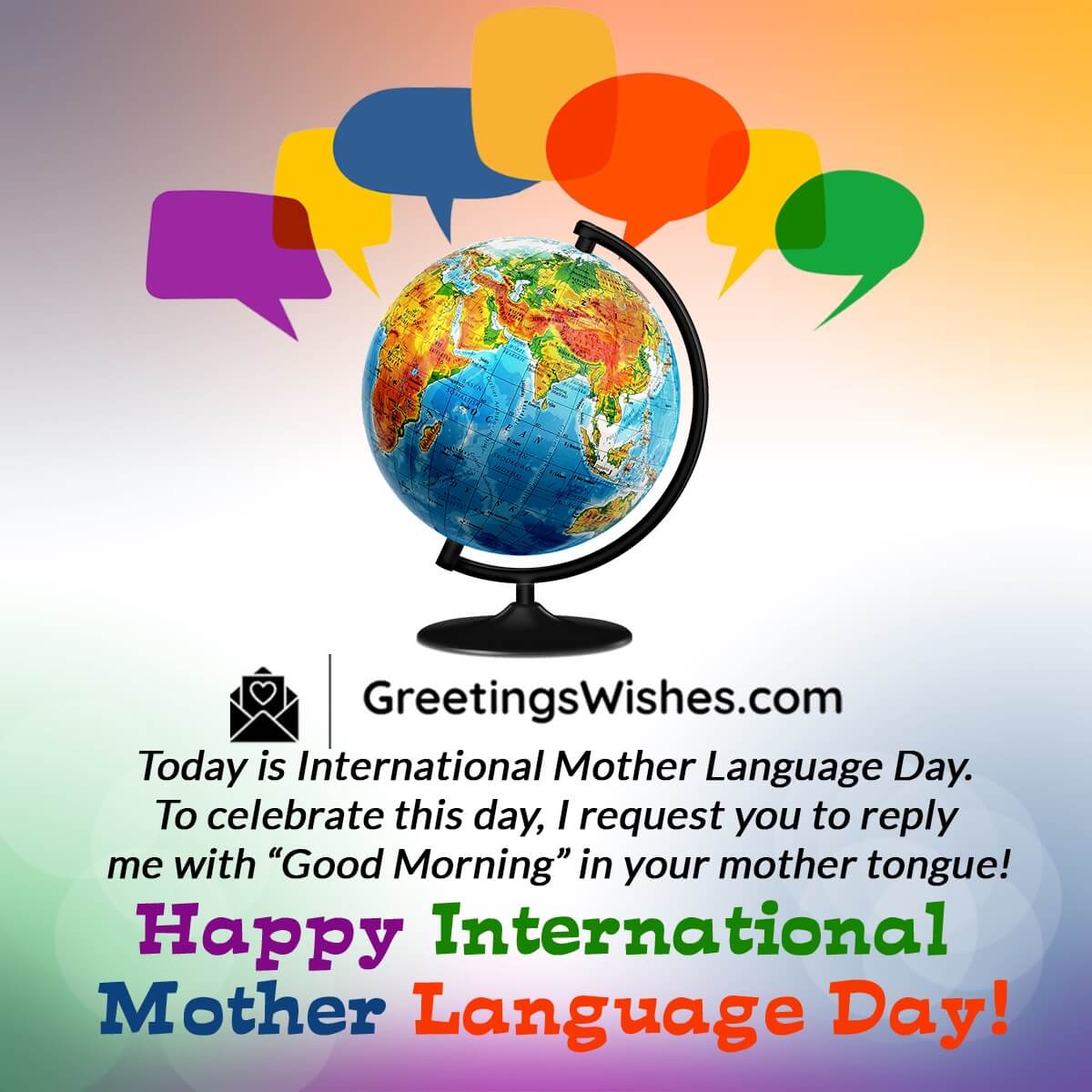
Mother Language Day Card
Today is International Mother Language Day. To celebrate this day, I request you to reply me with “Good Morning” in your mother tongue!
“Every language is a testament to the creativity and resilience of humankind. Happy International Mother Language Day!”
“May the melodies of our mother tongues resonate across the world. Happy International Mother Language Day!”
We may learn many new languages but there is one language that is very close to our heart and that is our mother language. Happy International Mother Language Day to you.
The occasion of International Mother Language Day must be celebrated with high spirits because every language deserves a lot of respect. Warm greetings to you.
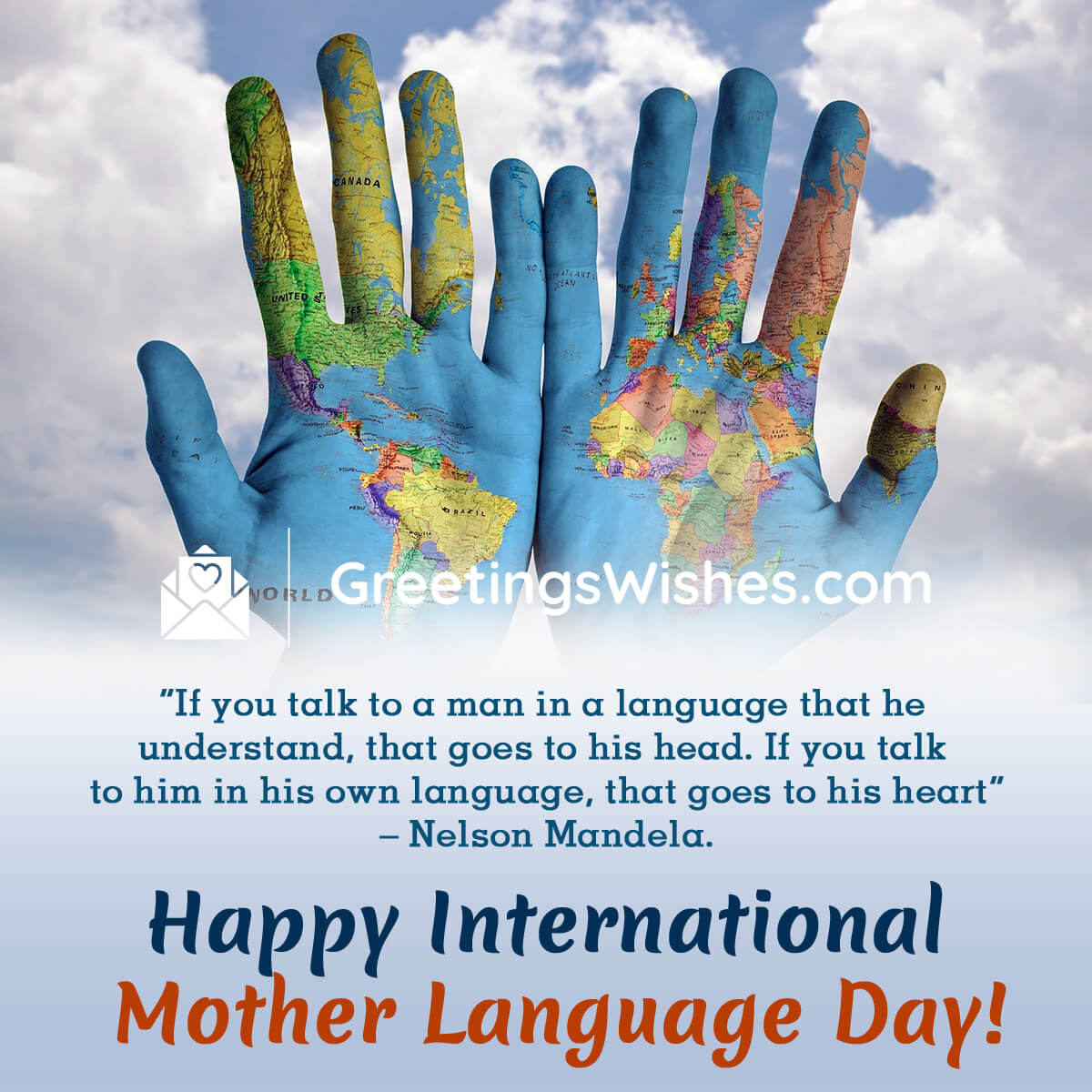
Mother Language Day Greetings
“If you talk to a man in a language that he understand, that goes to his head. If you talk to him in his own language, that goes to his heart” – Nelson Mandela. Happy International Mother Language Day!
Language is the road map of a culture. It tells you where its people come from and where they are going. – Rita Mae Brown
“Let’s celebrate the beauty of linguistic diversity and strive for a world where every language thrives. Happy International Mother Language Day!”
“Languages hold the keys to our cultural heritage and collective memory. Happy International Mother Language Day!”
Let us come together and give the much deserved respect and attention to our mother language to make this a wonderful International Mother Language Day.
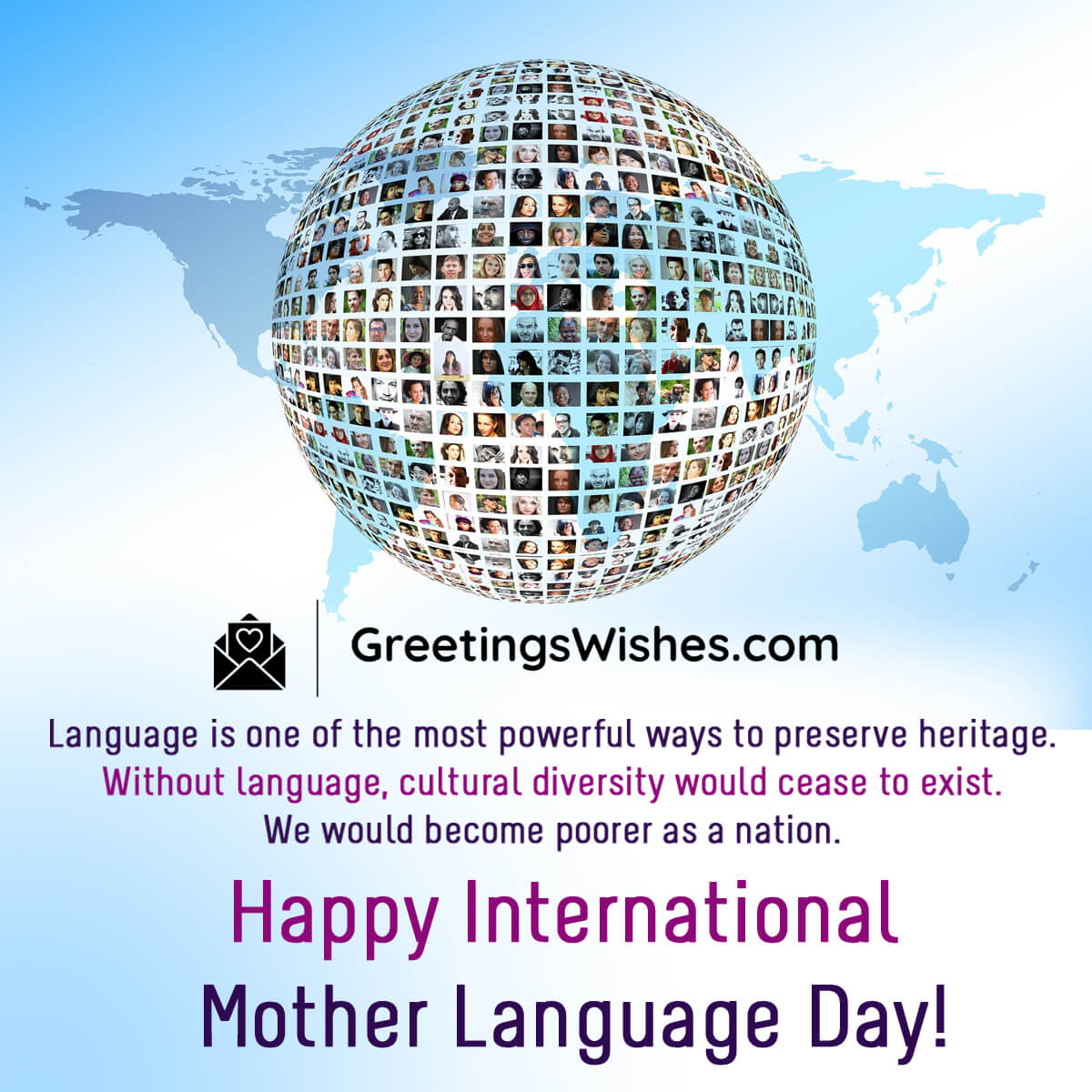
Mother Language Day Wishes
Language is one of the most powerful ways to preserve heritage. Without language, cultural diversity would cease to exist. We would become poorer as a nation. Happy International Mother Language Day!
Any time you think some other language is odd, recollect that yours is similarly as bizarre, you’re simply used to it. World comprises of numerous languages and culture , you have to regard them all. Happy International Mother Language Day!
“Today, let’s honor the languages that shape our thoughts, dreams, and aspirations. Happy International Mother Language Day!”
“On this International Mother Language Day, let’s embrace the richness of our linguistic mosaic and build bridges of understanding and solidarity.”
“Let’s celebrate the richness of languages and the beauty they bring to our world. Happy International Mother Language Day!”
We may learn many new languages but there is one language that is very close to our heart and that is our mother language. Happy International Mother Language Day to you.
As we reflect on these heartfelt messages, let’s honor the essence of linguistic diversity and unite in celebrating the significance of our mother tongues. Happy International Mother Language Day, embracing the beauty of languages that connect us all!
1. “A different language is a different vision of life.” – Federico Fellini
2. “Language is the roadmap of a culture. It tells you where its people come from and where they are going.” – Rita Mae Brown
3. “To have another language is to possess a second soul.” – Charlemagne
4. “Language exerts hidden power, like the moon on the tides.” – Rita Mae Brown
5. “Language is the dress of thought.” – Samuel Johnson
6. “One language sets you in a corridor for life. Two languages open every door along the way.” – Frank Smith
7. “Language is the blood of the soul into which thoughts run and out of which they grow.” – Oliver Wendell Holmes
8. “The limits of my language are the limits of my world.” – Ludwig Wittgenstein
9. “The more languages you know, the more you are human.” – Tomáš Garrigue Masaryk
10. “Language is the road map of a culture. It tells you where its people come from and where they are going.” – Rita Mae Brown
11. “Language is the means of getting an idea from my brain into yours without surgery.” – Mark Amidon
12. “Language is the dress of thought.” – Samuel Johnson
13. “Language is the archives of history.” – Ralph Waldo Emerson
14. “Language is the soul of intellect, and reading is the essential process by which that intellect is cultivated beyond the commonplace experiences of everyday life.” – Charles Scribner Jr.
15. “Language is the source of misunderstandings.” – Antoine de Saint-Exupéry
16. “A special kind of beauty exists which is born in language, of language, and for language.” – Gaston Bachelard
17. “Language shapes the way we think, and determines what we can think about.” – Benjamin Lee Whorf
18. “Without translation, we would be living in provinces bordering on silence.” – George Steiner
19. “Language is the most massive and inclusive art we know, a mountainous and anonymous work of unconscious generations.” – Edward Sapir
20. “One language sets you in a corridor for life. Two languages open every door along the way.” – Frank Smith
May these quotes ignite a passion for linguistic diversity and inspire a deeper appreciation for the richness of our mother tongues. Happy International Mother Language Day, celebrating the tapestry of languages that enrich our world!
International Mother Language Day activities can include a range of engaging and educational initiatives to celebrate linguistic diversity and promote multilingualism. Here are some activity ideas:
1. **Language Workshops**: Host interactive workshops where participants can learn basic phrases or writing systems of different languages, led by native speakers or language experts.
2. **Multilingual Storytelling**: Organize storytelling sessions where stories are shared in various languages, showcasing the richness of oral traditions and cultural heritage.
3. **Language Exchange Events**: Facilitate language exchange meetups where people can practice speaking different languages with native speakers in a supportive and inclusive environment.
4. **Language Games and Quizzes**: Arrange language-themed games, quizzes, or trivia competitions to test participants’ knowledge of different languages and cultures.
5. **Cultural Performances**: Showcase traditional music, dance, and performances representing diverse linguistic communities, celebrating the cultural diversity expressed through language.
6. **Language Film Screenings**: Screen films or documentaries in different languages, followed by discussions exploring linguistic themes, cultural contexts, and storytelling traditions.
7. **Language Art and Crafts**: Organize art and craft workshops where participants can create language-themed artworks, calligraphy, or crafts inspired by different writing systems and cultural symbols.
8. **Language Book Fair**: Host a book fair featuring literature, poetry, and educational materials in various languages, promoting reading and literacy in mother tongues.
9. **Language Debates and Discussions**: Facilitate debates or panel discussions on topics related to language policy, language rights, bilingual education, and language preservation.
10. **Language Exhibitions**: Set up exhibitions showcasing linguistic diversity, featuring displays of language maps, historical artifacts, linguistic tools, and information about endangered languages.
11. **Community Language Projects**: Collaborate with local communities to develop language revitalization projects, including language documentation, preservation efforts, and digital archives.
12. **Virtual Language Exchange**: Organize online language exchange platforms or virtual events where participants can connect with speakers of different languages from around the world.
By engaging in these International Mother Language Day activities, participants can celebrate the beauty of linguistic diversity, foster cross-cultural understanding, and promote the preservation and appreciation of mother tongues.
1. **What is International Mother Language Day?**
International Mother Language Day, observed on February 21st, is a worldwide commemoration of linguistic diversity and the promotion of mother languages.
2. **Why is International Mother Language Day celebrated on February 21st?**
February 21st marks the day when students in Bangladesh protested for the recognition of Bengali as a national language in 1952, leading to the Language Movement and later the establishment of International Mother Language Day.
3. **Who established International Mother Language Day?**
International Mother Language Day was established by UNESCO in 1999 to honor the language movement in Bangladesh and promote linguistic diversity worldwide.
4. **What is the significance of International Mother Language Day?**
International Mother Language Day highlights the importance of preserving mother languages, promoting multilingualism, and celebrating linguistic diversity as a means of fostering understanding and peace.
5. **How is International Mother Language Day celebrated globally?**
International Mother Language Day is celebrated through various activities such as language festivals, cultural events, educational workshops, and advocacy initiatives to promote language rights and preservation.
6. **What is the theme of International Mother Language Day for this year?**
The theme of International Mother Language Day varies each year, focusing on different aspects of linguistic diversity, language preservation, multilingual education, or related topics.
7. **Why is it important to preserve mother languages?**
Preserving mother languages is essential for maintaining cultural identity, transmitting traditional knowledge, fostering communication within communities, and promoting inclusive education.
8. **How many languages are spoken worldwide?**
There are estimated to be around 7,000 languages spoken worldwide, reflecting the rich diversity of human communication and culture.
9. **What are some endangered languages?**
Endangered languages are those at risk of disappearing due to declining numbers of speakers. Examples include Indigenous languages, minority languages, and languages with fewer speakers.
10. **What are some initiatives to promote multilingualism and language preservation?**
Initiatives include bilingual education programs, language revitalization projects, digital archives for language documentation, and advocacy for language rights and policies.
11. **How can individuals celebrate International Mother Language Day?**
Individuals can celebrate by learning phrases in a new language, sharing language-related content on social media, attending cultural events, or supporting language preservation efforts.
12. **What role does language play in cultural identity?**
Language is closely tied to cultural identity, shaping how people express their values, beliefs, traditions, and worldview, and fostering a sense of belonging within communities.
13. **How does language influence communication and understanding?**
Language influences communication by shaping how ideas are expressed, facilitating mutual understanding, and serving as a bridge between individuals from different linguistic backgrounds.
14. **What are the benefits of being multilingual?**
Benefits include enhanced cognitive abilities, improved communication skills, increased cultural understanding, broader career opportunities, and greater access to diverse perspectives and knowledge.
15. **How can governments promote linguistic diversity and language rights?**
Governments can promote linguistic diversity by implementing policies that support multilingual education, protect minority languages, ensure language rights, and foster inclusive communication.
16. **What are some challenges in preserving mother languages?**
Challenges include language endangerment due to globalization, language shift towards dominant languages, lack of resources for language documentation and revitalization, and limited support for minority language speakers.
17. **What is the role of technology in language preservation?**
Technology plays a crucial role in language preservation through digital archives, language learning apps, online language communities, and tools for linguistic research and documentation.
18. **How can individuals contribute to language preservation efforts?**
Individuals can contribute by documenting oral traditions, teaching their language to younger generations, supporting language revitalization initiatives, and advocating for language rights.
19. **What are some examples of successful language revitalization projects?**
Examples include the Maori language revival in New Zealand, the efforts to preserve Native American languages in the United States, and the revitalization of Hebrew as a spoken language in Israel.
20. **What is the future of linguistic diversity in the digital age?**
The digital age presents both opportunities and challenges for linguistic diversity, with increasing access to digital tools for language preservation, but also the risk of language loss due to globalization and language shift.
Reflecting on these questions and answers illuminates the significance of linguistic diversity and the importance of celebrating International Mother Language Day. Let’s continue to cherish and preserve our mother tongues as vital threads in the fabric of our global community.
1. **What is the significance of February 21st in relation to International Mother Language Day?**
a) It marks the birth anniversary of a language activist.
b) It commemorates the adoption of a language as a national symbol.
c) It honors those who sacrificed their lives for language rights.
d) It celebrates the publication of the first multilingual dictionary.
2. **Who established International Mother Language Day?**
a) United Nations
b) UNESCO
c) World Health Organization
d) International Labor Organization
3. **In which country did the Language Movement take place, leading to the establishment of International Mother Language Day?**
a) India
b) Pakistan
c) Bangladesh
d) Sri Lanka
4. **How many languages are estimated to be spoken worldwide?**
a) Around 1,000
b) Around 3,000
c) Around 5,000
d) Around 7,000
5. **What is the main purpose of International Mother Language Day?**
a) To promote a specific language as the global lingua franca.
b) To celebrate linguistic diversity and raise awareness about language rights.
c) To establish a universal language for international communication.
d) To honor the achievements of famous linguists throughout history.
6. **Which year was International Mother Language Day officially recognized by the United Nations General Assembly?**
a) 1992
b) 2000
c) 2002
d) 2010
7. **What is UNESCO’s role in International Mother Language Day?**
a) UNESCO organizes language learning workshops on this day.
b) UNESCO encourages countries to adopt a common mother language.
c) UNESCO promotes linguistic diversity and cultural heritage.
d) UNESCO declares a global holiday for language enthusiasts.
8. **What does the term “mother language” refer to?**
a) The first language a person learns from their mother.
b) The most widely spoken language in a country.
c) The language spoken by women in a community.
d) The official language of a nation.
9. **Which language is used as the primary focus of International Mother Language Day celebrations?**
a) English
b) French
c) Bengali
d) Spanish
10. **What is the theme of International Mother Language Day for this year?**
a) Linguistic Rights and Empowerment
b) Language Preservation and Revitalization
c) Multilingual Education for All
d) Celebrating Cultural Diversity through Language
11. **What can individuals do to celebrate International Mother Language Day?**
a) Learn a new language phrase or word.
b) Share language-related content on social media.
c) Attend a cultural event celebrating linguistic diversity.
d) All of the above
12. **Which continent is home to the most linguistic diversity?**
a) Europe
b) Asia
c) Africa
d) South America
13. **What role does language play in cultural identity?**
a) It has no influence on cultural identity.
b) It shapes how individuals express their cultural heritage.
c) It is solely determined by religious beliefs.
d) It limits cultural exchange between different communities.
14. **How does International Mother Language Day promote peace and understanding?**
a) By encouraging linguistic diversity and respect for all languages.
b) By advocating for the adoption of a universal language.
c) By excluding minority languages from recognition.
d) By promoting linguistic superiority of certain languages.
15. **Which country has the highest number of languages spoken within its borders?**
a) India
b) China
c) Nigeria
d) Papua New Guinea
16. **What is the term used to describe languages that are at risk of disappearing?**
a) Endangered languages
b) Universal languages
c) Major languages
d) Trade languages
17. **What can governments do to promote linguistic diversity and language rights?**
a) Implement policies supporting multilingual education.
b) Preserve and protect minority languages.
c) Ensure equal access to government services in all languages.
d) All of the above
18. **What is the main message conveyed by International Mother Language Day?**
a) There is one superior language that should be adopted globally.
b) Language diversity should be preserved and celebrated.
c) Only official languages should be recognized and used.
d) Language rights are irrelevant to global communication.
19. **How has technology contributed to language preservation efforts?**
a) By promoting the dominance of a single language.
b) By providing digital tools for language documentation and revitalization.
c) By eliminating the need for multilingualism.
d) By restricting access to language resources.
20. **What can individuals do to support language preservation efforts in their communities?**
a) Document oral traditions and folklore.
b) Teach their language to younger generations.
c) Advocate for language rights and policies.
d) All of the above
Feel free to use these questions for your International Mother Language Day quiz!
The ten most widely spoken languages in the world are:
1. **English**: Spoken by over 1.5 billion people globally, it serves as a primary or secondary language in many countries and is widely used in business, education, and international communication.
2. **Mandarin Chinese**: With over 1.1 billion speakers, Mandarin Chinese is the most spoken language in the world by native speakers. It is the official language of China and is also spoken in Taiwan and Singapore.
3. **Hindi**: Spoken by over 600 million people primarily in India, Hindi is one of the official languages of India and is widely used in government, media, and everyday communication.
4. **Spanish**: With over 460 million speakers, Spanish is the official language of 20 countries and is widely spoken in Latin America, Spain, and parts of the United States.
5. **French**: Spoken by over 220 million people worldwide, French is an official language in 29 countries and is widely used in diplomacy, international organizations, and cultural exchange.
6. **Arabic**: With over 310 million native speakers, Arabic is the official language of 22 countries and is widely spoken across the Middle East and North Africa.
7. **Bengali**: Spoken by over 230 million people primarily in Bangladesh and India, Bengali is one of the most spoken languages in South Asia.
8. **Russian**: With over 255 million speakers, Russian is the most widely spoken Slavic language and is the official language of Russia and several other countries in Eastern Europe and Central Asia.
9. **Portuguese**: Spoken by over 220 million people, Portuguese is the official language of Portugal, Brazil, and several other countries in Africa and Asia.
10. **Urdu**: Spoken by over 230 million people primarily in Pakistan and India, Urdu is one of the official languages of Pakistan and is widely used in literature, media, and education.
These languages are not only spoken by millions of people but also have significant cultural, economic, and political influence globally.
1. **Mandarin Chinese (Simplified)**: 我爱我的母亲,我为我的母语感到自豪。
2. **Spanish**: Amo a mi madre, y estoy orgulloso de mi lengua materna.
3. **English**: I love my mother, and I am proud of my mother language.
4. **Hindi**: मैं अपनी माँ से प्यार करता हूँ, और मुझे अपनी मातृभाषा पर गर्व हैं।
5. **Bengali**: আমি আমার মা ভালোবাসি, এবং আমি আমার মাতৃভাষায় গর্বিত।
6. **Portuguese**: Eu amo minha mãe e tenho orgulho da minha língua materna.
7. **Russian**: Я люблю свою мать, и я горжусь своим родным языком.
8. **Japanese**: 私は母を愛しています、そして私は私の母国語を誇りに思っています。
9. **Urdu**: میں اپنی ماں سے محبت کرتا ہوں، اور میں اپنی ماں کی زبان پر فخر محسوس کرتا ہوں۔
10. **Swahili**: Ninampenda mama yangu, na nina fahari ya lugha yangu ya mama.
The ten most spoken languages in India are:
1. **Hindi**: The official language of the Indian government and spoken by the majority of the population.
2. **Bengali**: Predominantly spoken in the eastern regions of India, particularly in West Bengal and Tripura.
3. **Telugu**: Primarily spoken in the southern state of Andhra Pradesh and Telangana.
4. **Marathi**: Mainly spoken in the state of Maharashtra and surrounding regions.
5. **Tamil**: Predominantly spoken in the southern state of Tamil Nadu and parts of Sri Lanka.
6. **Urdu**: Widely spoken, especially in states like Uttar Pradesh, Telangana, and Jammu and Kashmir.
7. **Gujarati**: Mainly spoken in the state of Gujarat and among the Gujarati diaspora worldwide.
8. **Kannada**: Predominantly spoken in the southern state of Karnataka.
9. **Odia (Oriya)**: Primarily spoken in the eastern state of Odisha.
10. **Punjabi**: Mainly spoken in the state of Punjab and surrounding regions.
These languages represent a diverse linguistic landscape in India, reflecting the country’s rich cultural heritage and regional diversity.
1. **Hindi**: मैं अपनी माँ से प्यार करता हूँ, और मुझे अपनी मातृभाषा पर गर्व हैं।
2. **Bengali**: আমি আমার মা ভালোবাসি, এবং আমি আমার মাতৃভাষায় গর্বিত।
3. **Telugu**: నేను నా తల్లిని ప్రేమిస్తున్నాను, మరియు నా తల్లి భాషలో గర్వించుకుందాం.
4. **Marathi**: माझी आईला मी प्रेम करतो, आणि माझ्या मातृभाषेवर मला अभिमान आहे।
5. **Tamil**: என் தாயை நான் காதலிக்கிறேன், மேலும் என் தாய் மொழியின் பெருமையாக இருக்கிறேன்.
6. **Urdu**: میں اپنی ماں سے محبت کرتا ہوں، اور میں اپنی ماں کی زبان پر فخر محسوس کرتا ہوں۔
7. **Gujarati**: હું મારી માતાને પ્રેમ કરું છું, અને હું મારી માતૃભાષા પર ગર્વ કરું છું।
8. **Kannada**: ನಾನು ನನ್ನ ತಾಯಿಯನ್ನು ಪ್ರೀತಿಸುತ್ತೇನೆ, ಮತ್ತು ನನ್ನ ತಾಯಿ ಭಾಷೆಯಲ್ಲಿ ಹೆಮ್ಮೆಪಡುತ್ತೇನೆ।
9. **Odia (Oriya)**: ମୁଁ ମୋର ମାନକୁ ଭଲ ପାଇଁ, ଏବଂ ମୁଁ ମାନକୁ ଗୌରବିତ ଅଛି।
10. **Punjabi**: ਮੈਂ ਆਪਣੀ ਮਾਂ ਨੂੰ ਪਿਆਰ ਕਰਦਾ ਹਾਂ, ਅਤੇ ਮੈਂ ਆਪਣੀ ਮਾਂ ਦੀ ਭਾਸ਼ਾ ‘ਤੇ ਮਾਣ ਰੱਖਦਾ ਹਾਂ।
These translations represent the statement “I Love My Mother, And I am Proud of my Mother Language.” in the 10 most spoken languages of India.